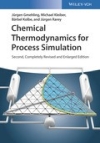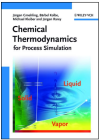POW - Octanol-Water Partition Coefficients

The POWDDB data bank stores octanol-water partition coefficients (POW). Based on these data, a special POW-UNIFAC (Wienke, 1993) has been developed.
As an example, the experimental octanol-water distribution coefficients for hexachlorobenzene as function of temperature are shown on the right hand side. At 25°C the data cover a range of nearly 3.5 orders of magnitude.
Numerous publications reporting this value come from sources with limited experience in the field of experimental determination of thermophysical properties and were published in journals focusing on environmental science. It is therefore of great importance to have a large database available and not rely on limited information from only a single reference.
The DDB online search can show a list of components for which octanol-water partition coefficients are available.
Selected Scientific Papers
| 1998 | Prediction of Octanol-Water Partition Coefficients, Henry Coefficients and Water Solubilities Using Unifac | Wienke G., Gmehling J. | Journal | Toxicol.Environ.Chem., 65, 1, 57 86 (1998) |
| 1993 | Vorausberechnung von Octanol/Wasser-Verteilungskoeffizienten mit Hilfe der UNIFAC-Methode | Dallos A., Wienke G., Ilchmann A., Gmehling J. | Journal | Chem.Ing.Tech., 65, 2, 201 203 (1993) |
Selected Scientific Papers (Experimental Data)
| 1998 | Enantiomerentrennung mit der Flüssig/Flüssig-Gegenstromchromatographie | Buchholz K., Schulte B., Gmehling J., Martens J | Journal | Chem.Ing.Tech., 70, 7, 850 856 (1998) |
| 1993 | Bestimmung von Verteilungskoeffizienten mit Hilfe der Flüssig/Flüssig-Gegenstrom-Chromatographie | Ilchmann A., Wienke G., Meyer T., Gmehling J. | Journal | Chem.Ing.Tech., 65, 1, 72 75 (1993) |
| 1991 | Die Flüssig-Flüssig-Gegenstromchromatographie - Eine zuverlässige Methode zur Bestimmung von Verteilungskoeffizienten | Ilchmann A., Wienke G., Meyer T., Gmehling J. | internal report | Unpublished Data, 180, 2, 1 11 (1991) |


